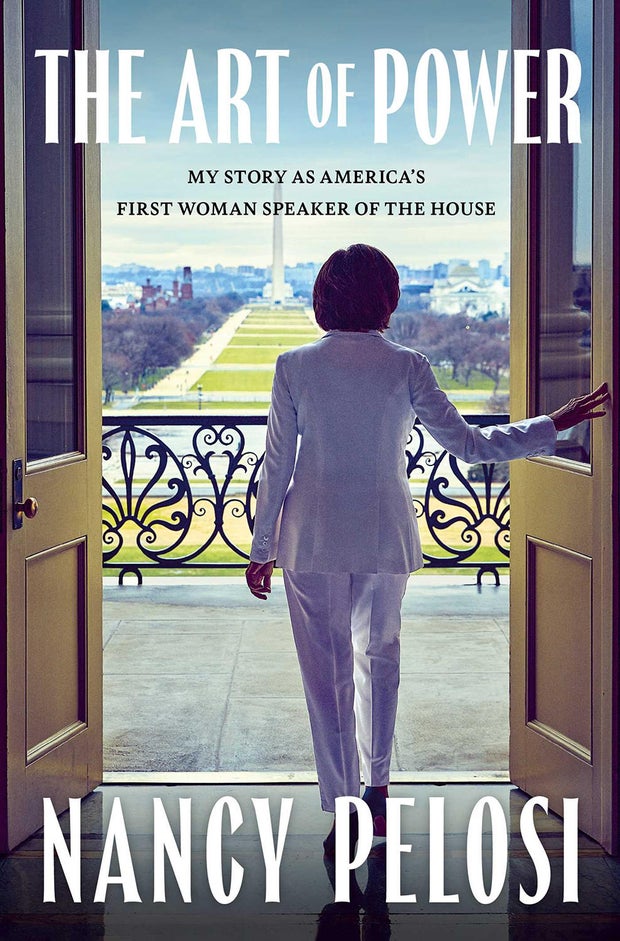Until now, Nancy Pelosi has not discussed the trauma of October 28, 2022, when a man broke into her house in San Francisco and hit her husband, Paul Pelosi, then 82, in the head at least three times with a hammer. Surgeons had to remove part of his skull to save his life.
“My husband and I have never talked about this,” Pelosi said. “The doctors have supported that, because they don’t want him to revisit it.”
The assailant was targeting Nancy Pelosi. “He was looking for me,” she said. “Imagine the guilt of all of that – it’s just a horrible thing.”
She describes the horror in her new book, “The Art of Power.” In it, she quotes her daughter, documentary filmmaker Alexandra Pelosi, who tells her, “You have to give it up – the Speakership, Congress, everything in your public life.”
Asked whether her daughter blamed her, Nancy Pelosi said, “Well, I blame me. I mean, not blame me. I was the target. My family, frankly, blames certain elements of the Republican Party who had been demonizing me for about 20 years, every election and the rest – cloven feet, horns on the head, a horrible person, in flames, a devil, and all of that. The sad thing about my husband’s assault was that they just made a joke of it. They thought it was funny. And people laughed. So, [Trump] was an instigator of violence and then made light of it.”
There have been reports that Pelosi orchestrated a coordinated effort to squeeze President Joe Biden to drop out. Asked what she told Mr. Biden, Pelosi replied, “Well, I’ve never shared any conversations with a President of the United States publicly, no.”
“It’s said that he’s furious at you,” said Stahl. “Is he?”
“Well, he knows that I love him very much,” replied Pelosi.
“I understand that you don’t want to own this. But it is so well-reported that you were the leader of a pressure campaign.”
“No, I wasn’t a leader of any pressure party. Well, let me say things that I didn’t do. I didn’t call one person. I did not call one person. I could always say to him, ‘I never called anybody.’ What I’m saying is, I had confidence that the president would make the proper choice for our country, whatever that would be, and I said that. ‘Whatever that is, we’ll go with.'”
Stahl asked, “Had you seen a decline in Joe Biden? And did you think he needed to step aside?”
Pelosi said, “No. My whole point was, whatever he decides, but we have to have a more aggressive campaign.”
She mentioned Mr. Biden’s many accomplishments, including his forceful leadership of the NATO Summit with other Western heads of state. “He was in a good place to make whatever decision – the top of his game,” Pelosi said. “Such a consequential President of the United States, a Mount Rushmore kind of President of the United States.”
Stahl asked, “Are you really saying that he belongs up there on Mount Rushmore? Lincoln and Joe Biden?”
“Well, you got Teddy Roosevelt up there, and he’s wonderful. I don’t say take him down. But you can add Biden.”
If there were a Mount Rushmore for Speakers of the House, Nancy Pelosi would certainly be up there, commemorating her 20 years as a commanding leader in Congress, until she relinquished Democratic Party leadership a year ago.
In “The Art of Power,” Pelosi, now 84, looks back at some of the battles she’s most proud of.
She stresses it is not a memoir: “There’s certain episodes of our history that I played a major role in. So, I wanted to write about that just to show my side of it, what happened in the room where it happened, where I was.”
She wasn’t just in the room. She was working the room … usually running it, as during the financial bailout, COVID relief, the Affordable Care Act … and the dark day of January 6.
She writes about hearing the crowd attacking the Capitol saying “Nancy, we’re coming for you, bitch.”
Stahl said, “You knew what was happening that day was directed at you.”
“And the vice president,” Pelosi said. “It was an insurrection instigated by the President of the United States. He now tries to disassociate himself from it, blaming it on me and everybody else. But that’s the way he is. This was instigated by him.”
Also from Pelosi’s book: in response to Trump saying he was going to march to the Capitol, Pelosi remarked, “If he comes, I’m gonna punch him out for trespassing on the Capitol grounds. I’m gonna punch him out, and I’m gonna go to jail, and I’m going to be happy.”
“I knew that I would have to pay a price, to go to jail,” Pelosi said, “but I would be happy to do that.”
Pelosi is now turning her toughness to defeating Donald Trump. She calls him “the best organizer and fundraiser for the Democrats, because people know he should never set foot again in the White House – never should have, and shouldn’t again.”
Asked if she thinks Trump made a mistake in choosing Ohio Senator JD Vance as his running mate, Pelosi laughed: “I think it was a great choice!”
Stahl asked “What is your bit of advice for Kamala Harris on how to run this campaign against Donald Trump? Does she instigate a fight? Does she bait him?”
“Let me just say this, and this is what I tell everybody all the time: Just be yourself,” Pelosi said. “It’s the same advice I give to women – be yourself.”
Stahl said, “The opposition – the Trump people and he and JD Vance – are trying to portray Kamala Harris as being ‘weird.’ ‘She’s a radical, left-wing, San Francisco crazy lady. She’s weird and she’s nuts.'”
Pelosi said, “Well, the thing is, there’s no question that they understand I make people laugh at them. And that’s what they don’t like, is to be laughed at. On the other hand, what I have always said about Trump and now – I don’t know that much about Vance, but what we do know is menacing.”
So, what should Harris say? “Just talk about kitchen-table issues – ignore him,” said Pelosi.
No longer part of the leadership in the House, Pelosi is still running for re-election for her seat from San Francisco.
Asked if she had ever been asked to run for president, Pelosi replied, “I haven’t been asked, but I was encouraged to put my name in there sometime for vice president. I said, ‘Why would I wanna be vice president?’ I’m a legislator. I love legislating. People have to understand it’s serious work. I mean, you really have to listen. What is the judgment you bring as to what priorities can prevail? What is your strategy to get it done? It’s constant. It’s constant. And it’s being respectful of all kinds of points of view – inside maneuvering, outside mobilization. It’s great. I love being a legislator.”
READ AN EXCERPT: Nancy Pelosi on “The Art of Power”
For more info:
Story produced by Gabriel Falcon. Editor: Joseph Frandino.




